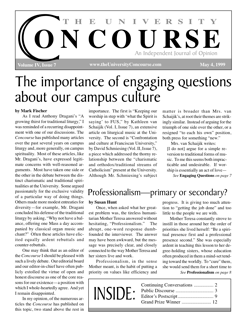The will and the intellect are inseparable
by Martha L. Blandford
Because of my frequent readings of economic and politically-oriented magazines, I am used to a literary style that is frequently brash, sarcastic or pompous in tone. The Concourse has introduced me to an altogether new rhetoric. Shortly after I first received it four years ago, I commented on this to my husband. He remarked truly that learning to argue with sensitivity was a mark of humility and maturity. So, please know how grateful I am to the Concourse for providing inspirational examples of this!
Further, I hope Ben Brown will write in more frequently! His article on education was a valuable contribution to the discussion. His points are well expressed, but I’m not sure I agree with them all. Even after reading his Newman quotes, I have difficulty granting that there is such a clear-cut dichotomy between the intellect and the will. If it is true, as Ben Brown states, that “education has to do with the intellect, not with the will,” then it seems reasonable to conclude that cognition is something non-volitional or automatic, perhaps. But, as I understand it, thinking is not non-volitional, nor do the connections of logic occur in our brains automatically.
The pre-conceptual level of consciousness, where our senses are stimulated, may well be non-volitional. But it seems to me that the will enters the picture when man chooses to make abstractions. In this sense, the ability to reason is given to man by God—“infused,” if you will, but man must freely choose whether and how he will make use of this gift. I know the Holy Spirit figures prominently into the whole equation, prompting us to the Light, but man must accept the holy prompting.
I most definitely understand and agree with Ben Brown’s general point that there is a distinct difference between a moral person and an well-educated person. I guess my point is that in parsing volition from intellect you may tacitly teach students that knowledge should come upon them, instead of their coming upon it—which often requires personal struggle.
Martha (Cotton) Blandford, Class of ‘89


